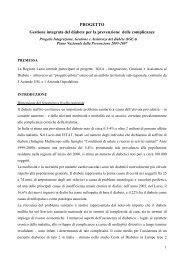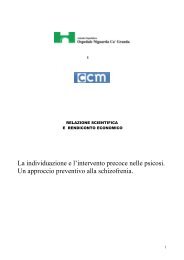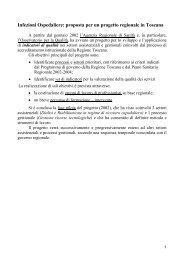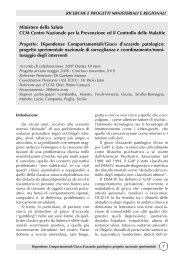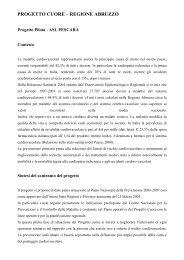Gaining health : analysis of policy development in European ...
Gaining health : analysis of policy development in European ...
Gaining health : analysis of policy development in European ...
You also want an ePaper? Increase the reach of your titles
YUMPU automatically turns print PDFs into web optimized ePapers that Google loves.
Chapter 4<br />
102<br />
the wake <strong>of</strong> political changes the Socialist party eventually<br />
established the ESY <strong>in</strong> 1983. S<strong>in</strong>ce then, there have been<br />
numerous proposals for reorganiz<strong>in</strong>g the <strong>health</strong> services<br />
and unify<strong>in</strong>g the <strong>health</strong> <strong>in</strong>surance funds. Few <strong>of</strong> these have<br />
been fully implemented, s<strong>in</strong>ce “Governments cont<strong>in</strong>ue to<br />
postpone costly political decisions either by replac<strong>in</strong>g the<br />
real problems with formalistic conflicts or by <strong>of</strong>fer<strong>in</strong>g shortterm<br />
remedies” (9).<br />
The issue <strong>of</strong> a broad <strong>policy</strong> for <strong>health</strong> has been largely<br />
absent from the political agenda for the past 20 years and,<br />
apart from the work <strong>of</strong> <strong>in</strong>dividual researchers, there has<br />
been little <strong>of</strong>ficial recognition <strong>of</strong> the problem <strong>of</strong> <strong>in</strong>equality<br />
<strong>in</strong> <strong>health</strong> status, observed <strong>in</strong> all countries across Europe. As<br />
<strong>in</strong> other countries, the National Statistical Service publishes<br />
regular statistical yearbooks conta<strong>in</strong><strong>in</strong>g data related<br />
to <strong>health</strong> (ma<strong>in</strong>ly mortality and hospital discharge data),<br />
though these do not usually reflect socioeconomic <strong>in</strong>equalities.<br />
At the beg<strong>in</strong>n<strong>in</strong>g <strong>of</strong> the 1990s, the M<strong>in</strong>istry <strong>of</strong> Health and<br />
Welfare (with the support <strong>of</strong> WHO) established an ad hoc<br />
committee, with experts from the University <strong>of</strong> Athens,<br />
the School <strong>of</strong> Public Health and others, to prepare a public<br />
<strong>health</strong> report. The report was prepared <strong>in</strong> Greek and, with<br />
WHO fund<strong>in</strong>g, translated <strong>in</strong>to English. Neither version appears<br />
to have been published or distributed after submission<br />
to the M<strong>in</strong>istry. Experts from the University <strong>of</strong> Athens<br />
voluntarily prepared analyses <strong>of</strong> the <strong>health</strong> status <strong>of</strong> the<br />
population for the period 1986–1996 and aga<strong>in</strong> for 1997–<br />
2006 (10), which they presented to the M<strong>in</strong>istry. We were<br />
unable, however, to locate any <strong>of</strong>ficial national report on<br />
the <strong>health</strong> status <strong>of</strong> the population. 7 It is difficult to understand<br />
therefore the evidence basis on which NCD <strong>policy</strong> is<br />
discussed and developed.<br />
7<br />
S<strong>in</strong>ce this case study was completed <strong>in</strong> October 2007, a National Action<br />
Plan for Public Health 2008–2012 (<strong>in</strong> Greek only) has been formulated by<br />
the M<strong>in</strong>istry <strong>of</strong> Health and Social Solidarity. The first chapter <strong>of</strong> the Action<br />
Plan <strong>in</strong>cludes a detailed <strong>analysis</strong> <strong>of</strong> the <strong>health</strong> <strong>of</strong> the population.<br />
Similarly, apart from mental <strong>health</strong>, there do not yet appear<br />
to be published policies relat<strong>in</strong>g to NCD, or their risks,<br />
although there are related <strong>health</strong> education campaigns. On<br />
the whole, Greece seems to have missed much <strong>of</strong> the vast<br />
mobilization for <strong>health</strong> promotion that has taken place <strong>in</strong><br />
Europe s<strong>in</strong>ce the Ottawa Charter and the WHO Health<br />
for All <strong>policy</strong>. There are signs that this may be about to<br />
change however, as the Law on Public Health (11), passed <strong>in</strong><br />
June 2005, calls <strong>in</strong>ter alia for reports on <strong>health</strong> status to be<br />
prepared at national and regional levels and for the national<br />
report to be presented annually to Parliament.<br />
2.2. How th<strong>in</strong>gs started<br />
The WHO Health for All <strong>policy</strong> seems to have had little<br />
impact at the national level <strong>in</strong> Greece, despite a number <strong>of</strong><br />
attempts by WHO Regional Office for Europe <strong>in</strong> the early<br />
1990s to <strong>in</strong>itiate such a <strong>policy</strong> <strong>development</strong> process. At the<br />
start <strong>of</strong> the 21st century, Costas Stefanis, a pr<strong>of</strong>essor <strong>of</strong> psychiatry<br />
who enjoyed <strong>in</strong>tensive <strong>in</strong>ternational collaboration,<br />
was M<strong>in</strong>ister for Health and Welfare. S<strong>in</strong>ce Greece held the<br />
EU presidency <strong>in</strong> 2003, Stefanis, together with Commissioner<br />
Byrne, signed the WHO Framework Convention for<br />
Tobacco Control on behalf <strong>of</strong> the EU. Under his leadership,<br />
public <strong>health</strong>, <strong>in</strong>clud<strong>in</strong>g the need to br<strong>in</strong>g care for mental<br />
<strong>health</strong> from <strong>in</strong>stitutions <strong>in</strong>to the community, ga<strong>in</strong>ed some<br />
prom<strong>in</strong>ence.<br />
The Supreme Council for Health (KESY) was reorganized<br />
to advise on public <strong>health</strong> issues. KESY is, however, composed<br />
<strong>of</strong> physicians and pr<strong>of</strong>essors from the medical schools<br />
and takes a medicalized view <strong>of</strong> <strong>health</strong>. It is responsible,<br />
<strong>in</strong>ter alia, for recogniz<strong>in</strong>g medical specialities and award<strong>in</strong>g<br />
educational leave and research grants. There does not,<br />
however, appear to have been a clear strategic plan for the<br />
disbursement <strong>of</strong> research grants. KESY did play an important<br />
role <strong>in</strong> putt<strong>in</strong>g <strong>in</strong> place the means to secure the 2004<br />
Olympic Games aga<strong>in</strong>st threats to <strong>health</strong>. It had hardly<br />
started <strong>in</strong> its enhanced public <strong>health</strong> role, however, when<br />
general elections brought <strong>in</strong> a change <strong>of</strong> government.<br />
Case studies: <strong>policy</strong> <strong>development</strong> <strong>in</strong> countries for tackl<strong>in</strong>g noncommunicable diseases




